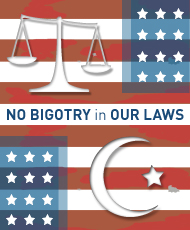
As the âü¯áû颈§Ý§Ã¿« has documented elsewhere, there has been a wave of anti-Muslim sentiment and attacks on Muslim communities in the U.S. in the last few years. Most recently, multiple states have proposed legislation banning the consideration of Islamic or "Sharia" law by state courts. Anti-Muslim groups claim these measures are necessary because the courts are being "overtaken" by Sharia law. Specifically, Sharia-ban proponents have pointed to a number of court cases involving Islamic religious doctrine or Muslim parties that supposedly evince a "Sharia threat" to our judicial system.
A new report by the âü¯áû颈§Ý§Ã¿«, Nothing to Fear: Debunking the Mythical "Sharia Threat" to Our Judicial System, examines, in detail, the cases repeatedly cited by anti-Muslim groups as evidence of the alleged "Sharia threat" to our judicial system. The report concludes that these cases do not stand for the principles that anti-Muslim groups claim. Rather, these court cases deal with routine matters, such as religious freedom claims and contractual disputes. Courts treat these lawsuits in the same way that they deal with similar claims brought by people of other faiths. So instead of the harbingers of doom that anti-Muslim groups make them out to be, these cases illustrate that our judicial system is alive and well, and operating as it should.
As we argue in our case challenging an Oklahoma Sharia law ban, prohibiting courts from considering Islamic law serves only one purpose: to bar Muslims from having the same rights and access to the courts as any other religious individuals. For example, if Sharia law were completely banned from consideration, it would be nearly impossible for Muslims to bring First Amendment claims when their religious rights are violated because the court could be barred from referring to a Muslim plaintiff's religious beliefs. This result would be patently unfair because it would single out Muslims for disfavorable treatment in our judicial system and render them second-class citizens.
People of all faiths routinely turn to our legal system to protect the right to practice their religion. The Supreme Court has, for example, upheld the right of a Christian to receive unemployment benefits after refusing to work on Sundays in violation of his religious beliefs; and the right of Amish parents to withhold their children from compulsory education on religious grounds. Muslims should not be denied the same opportunities in court, and lawsuits that happen to involve their Islamic faith do not present a "threat" to our legal system any more than claims asserted by Christians, Jews, or other religious individuals.

